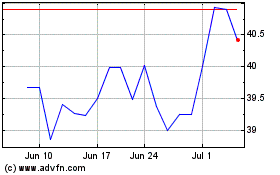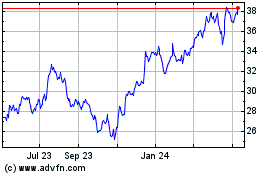An Improving, But Still Weak Earnings Picture - Earnings Trends
April 23 2014 - 5:32AM
Zacks
The following is an excerpt from this week's Earnings Trends
article. To see the full article, please click here.
An Improving, But Still Weak Earnings
Picture
Our initial call about the Q1 earnings season being extremely weak
and outright mediocre has turned out to be a bit premature. With a
bigger and more balanced sample of reports at our disposal now, the
Q1 earnings picture isn’t looking as bad. We are not suggesting
that the earnings picture has suddenly turned around; it hasn’t.
There is still not much earnings growth, top-line surprises are for
the most part negative and there is no change on the guidance
front.
What has changed is that while the Q1 earnings growth earlier on
appeared to be on track to be low even by the modest standards of
other recent quarters, it is slowly starting to look like those
quarters in some respects. The improvement over the last few days
is still not readily obvious from aggregate data, but it is there
if look close enough. Hardly a ringing endorsement of the earnings
picture, but nevertheless better than how the reporting season
appeared headed just a few days back.
This modest positive aside, there is still plenty that is
disappointing about the Q1 earnings. The most notable disappointing
aspect of the Q1 earning season thus far is the lack of any
improvement on the guidance front. Management guidance has been on
the weak side for almost two years now, keeping the revisions trend
firmly in the negative direction. We haven’t seen any improvement
on the guidance front thus far, though it may be a bit premature to
lose hope altogether.
The results thus far increase the odds that we wouldn’t see any
change on that front this earnings season either. Estimates for Q2
have started coming down already and the pace of negative revisions
will likely only accelerate as the rest of the reporting season
unfolds. This will be consistent with a trend that has been in
place for almost two years now; we know that the market made
impressive strides in that time period.
The market has been a lot less forgiving lately, with the broad
large-cap indexes barely up on the year. It will be interesting to
see if investors will respond any differently to the coming period
of negative estimate revisions.
Q1 Scorecard (as of April 24th, 2014)
Including this morning’s earnings announcements, we now have Q1
results from 204 S&P 500 members that combined account for
52.3% of the index’s total market capitalization. Total earnings
for these 204 companies are up +2.9% from the same period last year
on +3.6% higher revenues, with 68.3% beating EPS estimates and
44.0% coming out with positive revenue surprises.
Looking at the two sets of charts below – the first comparing total
earnings growth for these 204 companies with what these same
companies reported in 2013 Q4 and the 4-quarter average and the
second comparing the beat ratios – it’s hard to see anything but
all around weakness in the results thus far…
Q1 Growth Compared

Q1 Beat Ratios Compared

The EPS beat ratio is in in-line with recent quarterly averages,
while the revenue beat ratio is materially weaker than what we have
been seeing in recent quarters. What this means is that only 44.0%
of the 204 companies that have reported results have beat revenue
estimates, while 61.3% of the same group of companies beat top-line
expectations in 2013 Q4 and the 4-quarter average for this group is
53.4%. Hard to call this performance anything but weak.
The primary reason for the sub-par aggregate growth rate is the
drag from the Finance sector’s -8.4% earnings decline. We should
keep in mind, however, that the Finance sector’s weak growth
numbers are primarily due to Bank of America (BAC). Excluding the
roughly $2 billion negative swing in Bank of America’s total
earnings from the Finance sector, total earnings for the sector
would be down only -1.6% and excluding Bank of America from the
S&P 500 as whole would push up the aggregate growth rate to
+4.8%.
Excluding the Finance sector as a whole, total earnings for the
S&P 500 companies that have reported results would be up +6.9%
on +4.8% higher revenues, which is actually better than what we
have seen from the same group of ex-Finance companies in other
recent quarters. This may not continue through the end of the
earnings season, but it’s hard to overlook at this stage at
least.
Key Points
- Total earnings for the 204 S&P 500 companies that have
reported results are up 2.9%, with 67.3% beating earnings
expectations. Revenues for these companies are up +3.5%, with a
revenue ‘beat ratio’ of 44%.
- The performance from these companies, particularly the earnings
growth and revenue beat ratio, is weaker than what we have seen
from this same group of companies in recent quarters.
- The Finance sector shifted gear this quarter, becoming a drag
on aggregate growth after being a growth driver for many quarters.
Bank of America is a big reason for the sector’s weak growth this
quarter, but the sector’s total earnings growth would be weak
relative to other recent quarters even after excluding Bank of
America from the numbers.
- Excluding the Finance sector, total earnings for the rest of
S&P 500 companies that have reported Q1 results would be up
+6.9% on +4.8% higher revenues and modestly higher margins. This is
actually broadly in-line with the growth performance we have been
seeing from this ex-Finance cohort in recent quarters as well.
Gilead’s (GILD) strong results and its impact on the Medical sector
has materially helped this ex-Finance growth picture.
- Apple (AAPL) and Facebook (FB) had strong Q1 results, though
overall results for the Technology sector are not materially better
than what we had seen in the preceding quarter. Total earnings for
the 66.1% of the sector’s total market capitalization that have
reported results are up +8.3% on +4.9% higher revenues, with 66.7%
of the companies beating EPS expectations and 59.3% beating revenue
estimates.
- The composite Q1 picture for the S&P 500, combining the
actual results from the 204 companies with estimates for the 296
still to come, is for earnings to down -0.9% from the same period
last year, on +2.2% higher revenues and 29 basis points in lower
margins. Sequentially, total earnings for the S&P 500 are
expected to be down -4.6%, with the overall level of total earnings
for the index the lowest in a year.
- The Q1 earnings season is expected to be the low point of this
year’s earnings picture, both in terms of total earnings as well as
the growth rate. Total quarterly earnings reached an all-time
record in 2013 Q4, but are expected to fall short of that level in
2014 Q1. Expectations for the coming quarters reflect a strong ramp
up, with each of the following three quarters a new all-time
record.
- Guidance has overwhelmingly been negative in recent quarters
and we are seeing the same trend in place with the Q1 reports as
well. Continuation of that trend through the rest of this earnings
season will result in the by-now all-too-familiar negative
revisions to estimates for 2014 Q2.
- Total earnings in Q2 are currently expected to be up +4.3%,
followed by growth rates of +6.5% in Q3 and +9.0% in Q4. For the
full year, total earnings are expected to be up +7.8% in 2014 and
+12.2% in 2015.
- The bottom-up ‘EPS’ estimate for the S&P 500 for 2014
currently stands at $115.54, while the top-down estimate for the
same is currently at $116.33. For 2015, the bottom-up estimate
remains $129.53, with the top-down estimate from Wall Street
strategists currently at $125.
To see the full Earnings Trends report, please click here.
APPLE INC (AAPL): Free Stock Analysis Report
BANK OF AMER CP (BAC): Free Stock Analysis Report
FACEBOOK INC-A (FB): Free Stock Analysis Report
GILEAD SCIENCES (GILD): Free Stock Analysis Report
To read this article on Zacks.com click here.
Zacks Investment Research
Bank of America (NYSE:BAC)
Historical Stock Chart
From Mar 2024 to Apr 2024

Bank of America (NYSE:BAC)
Historical Stock Chart
From Apr 2023 to Apr 2024
